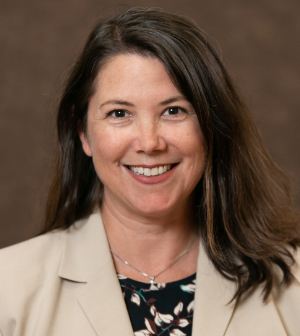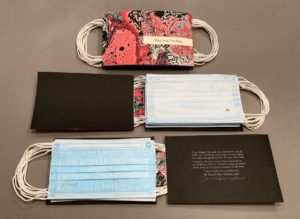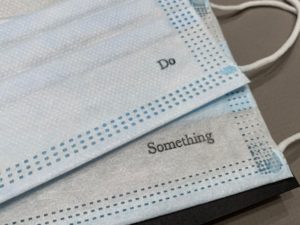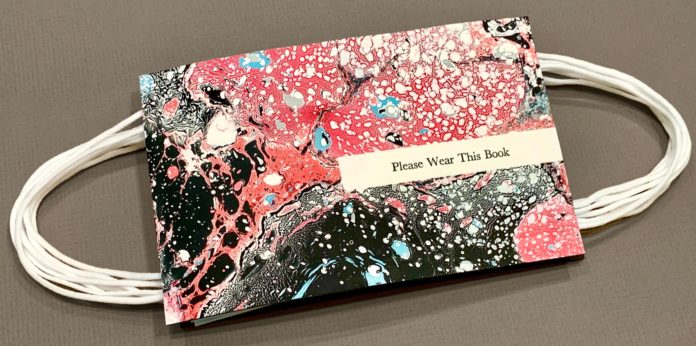A Mercer University professor created a book out of disposal surgical masks to raise money for COVID-19 relief in Macon and inspire mask wearing in the community.
Tennille Shuster, associate professor and director of graphic design, combined her love of letterpress printing, paper marbling and design to create an artist’s book, titled “Please Wear This Book.”

“I’ve been producing book art for a long time,” she said. “It’s an interesting subgenre that combines a variety of skills like printmaking, binding, marbling and graphic design to create an object that is a book as art — not a book of art.”
Each page of the handmade book is printed with a single word in the lower right corner. As you turn the pages, they read, “No One Can Do Everything But Everyone Can Do Something.”
There are 19 editions, for COVID-19, of course.
Wearing a mask or other cloth face covering is one of the best ways to prevent the spread of the novel coronavirus, experts say. The Centers for Disease Control and Prevention recommends people wear masks in public, especially when social distancing is difficult.
The masks in Shuster’s book may be unbound and worn. She printed each word on the white side of the mask, so it wouldn’t be visible if someone chooses to wear it.
“They’re completely wearable,” she said. “I made the binding particularly easy to pull apart and avoided printing on the blue side which faces out so that the masks could actually be worn if desired.”
She sold the artist’s books for $50 each, and proceeds are being donated to a local COVID-19 relief fund.
“I wanted to figure out a way to support downtown Macon businesses. Although I’m new to town, the downtown revitalization effort has been so exciting to witness, and I want to do what I can to help these shops and restaurants recover and make it through this difficult time,” she said.

To make the book, Shuster started by masking off and marbling the heavyweight watercolor paper for the cover using a traditional Turkish Ebru method in the stone pattern. Then, she peeled away where she had masked it, creating a white section on which she letterpress printed the title.
After letterpress printing the title, she typeset the individual words to print the masks, then typeset and printed the colophon — a brief statement about the artist’s book — in the back, as well as tips for proper mask usage. Once they were all printed, she glued up the end papers, trimmed everything down, folded in the spine and inserted the masks.

The books were made on letterpresses and equipment, including metal type, recently donated to Mercer’s Art Department, and Shuster hopes to utilize the newly acquired equipment in her typography class this fall.
She is excited to share her work with students.
“I was mindful to take photos throughout the design and production process to show my students, because I think they can learn a lot from seeing exactly what goes into a project from concept through completion,” she said.
As a result of sharing photos and videos of the new edition on social media, “Please Wear This Book” has been acquired by numerous permanent collections at rare book and manuscript libraries, including the Smithsonian American Art and Portrait Gallery Library.










